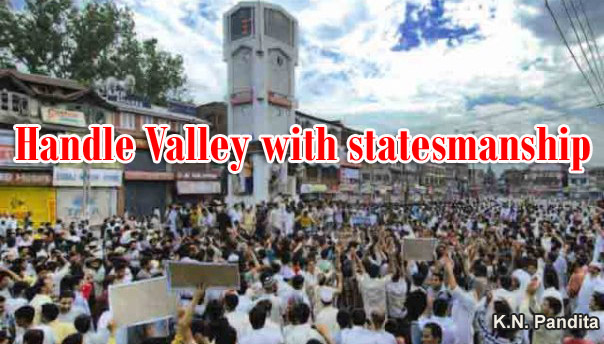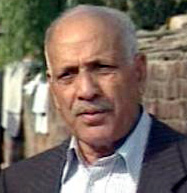Handle Valley with statesmanship

|

|
| The onus of maladministration of the State should not be brought exclusively to the doorsteps of the young chief minister. The type of political construct that we have in the J&K State leaves far less scope for anything called patently good governance whosoever at the helm of affairs. If the NC had not succumbed to the lust of power after the results of last election were announced, any astute politician would have advised NC to let its coalition partner ride the tiger. This would have dispelled a chance of direct confrontation between two major rival political parties. What we witness today in the valley is in fact the rising consciousness among Kashmri youth against dynastic rule and tyranny of majority. It’s rather uncouth form of demanding power sharing concession. Turmoil in the valley will subside at its proper time. But it is important for the Union of India to learn some harsh lessons from it. In 1947, India was divided on the basis of “two nations theory”. Kashmir valley being predominantly Sunni Hanafi Muslim, mostly illiterate and backward at that point of time, could not escape its impact. Those who advocated against it were hypocrites to their hilt. Indian leadership should not have been naïve to de-link Kashmir Muslim psyche from history and environment. Soon after State’s accession in 1947, Congress leadership began orchestrating as loud as it could that Kashmir was the symbol of its secularist dispensation. Indirectly, this was the death warrant for the non-Muslim communities in the valley which bore fruit in 1990. Indian secularism remains buried deep in the soil of Kashmir valley. Having set its foot on the land of Kashmir, the Congress hung to the apron string of National Conference pretending ideological commonality between the two. It was a political, moral and tactical blunder to put all eggs in one basket, nay in one dynasty. Congress should have known the widespread respect and influence that Mir Waiz household commanded with the masses of people in Kashmir. Arrest and deposition of Sheikh Abdullah in August 1953 spoke of the might of the state. But the real strength for taking that decision came not from the guts of Delhi rulers but from the cast iron personality of Bakhshi Ghulam Muhamamd. The situation that we have today could precisely have been the one on the eve of the Sheikh’s deposition. It was Bakhshi who piloted the ship in the disturbed waters of those days.. Never before and never after has Kashmir produced a leader of Bakshi’s stature. He not only made Kashmir, not only endeared himself kto one and all even to his adversaries but also secured nationalism on sound footing in the state. And then the Indian leadership let him down through a base Machiavellian stratagem. He died an ignominious death. Kashmiris refused space for his graveyard just as they refuse to let the Sheikh lie in peace in his grave by the Dal Lake. When the Sheikh returned to power for the second time in 1975, he thought of reconciliation with old colleagues and sent a word to Maulana Masudi in Ganderbal to rejoin his old flock of NC. The Maulana sent him a massage that he would gladly do so but then they both should first pay obeisance at the grave of the Bakhshi Sahib and tender apology to him saying “ we did the same what you had done in 1953”. This was related to the writer by Maulana Masudi himself. New Delhi lost Kashmir the day Hindu minority of the valley was extirpated from its homeland. Therein lay the roots of present turmoil. The way New Delhi reacted to this immense challenge to the fundamentals of its political philosophy showed that the Congress subtly supported theocratization of Kashmir. Criminal lack of will of the Indian State in restoring its secular credentials in Kashmir emboldened separatists, secessionists and ambivalent political leadership to play their card adroitly and dangerously. New Delhi downplayed the importance of the return of internally displayed people to the political construct of the valley. On the recommendation of pseudo-nationalist leadership of the valley, it lent covert support to all attempts that kept the displaced persons in a sate of limbo. Now that law and order in the valley have broken down, curfew trivialized, administration almost collapsing, opposition is aggressively defying the law to the extent of locking the civil secretariat, an impression is gathered that the beleaguered chief minister rules by proxy receiving day to day instructions from New Delhi. In desperation, he has listed four pre-requisites for return of normalcy in the valley and all the four are threadbare appeasement of the protesting crowds or their leadership. Kamarajing him will be the disastrous repetition of the story of Bakhshi Ghulam Muhammad. The harsh lesson for the Union government is this: either retain the valley as part of Indian democratic – secular structure or hand it over to rabid fundamentalists through an open and public agreement with its leadership eschewing the pseudo-nationalist chapter(s) that has failed to deliver the goods. What need is there for the security forces to patrol the streets in Srinagar and other towns. Let Kashmir police and its hierarchy play the role of security personnel while Indian troops man the border. In the same manner let power be handed over to District authority levels in Jammu regions. Nevertheless, if somebody in New Delhi has the courage to rise to the occasion, he should ask for resisting all pressures in the valley. Succumbing to defiant and law breaking mobs energized by religious frenzy is not the way of statesmanship or of nation building. The President of world’s strongest democracy, namely the United Sates, too, had to fight a civil war to keep the great nation united. Close ranks in Kashmir and defeat blackmailers by refusing to be intimidated. Do not trivialize the name and dignity of our heroes in olive green and do not crave for the hemlock of appeasement. |
| |
 *K.N. Pandita: Born in Baramulla, Kashmir in 1929 did graduation from St. Joseph’s College in Arts with English literature. The tribal raid of October 1947 destroyed his family like hundreds of other Kashmiri Hindu families in Baramulla.
*K.N. Pandita: Born in Baramulla, Kashmir in 1929 did graduation from St. Joseph’s College in Arts with English literature. The tribal raid of October 1947 destroyed his family like hundreds of other Kashmiri Hindu families in Baramulla.After doing M.A. from Punjab University, he served as Lecturer in State Degree Colleges and in 1958 earned a scholarship from the Indian Ministry of Education for higher studies at the University of Teheran, Iran. Four years of study and research at the University of Teheran earned him a Ph.D. in Iranian Studies. He joined Kashmir University in 1963 and it’s Centre of Central Asian Studies in 1976. He rose to become Professor and Director of this Centre till his superannuation in 1987. He is not only the first Kashmiri to obtain Ph.D. from Teheran University but is also the first to have worked in close collaboration with a number of Central Asian Academies of Science particularly the Tajik Academy. His travelogue titled My Tajik Friends won him Sovietland Nehru Award 1987. |
| |
| Copyrights © 2007
Shehjar online
and
KashmirGroup.com
. Any content, including but not limited to text, software, music, sound, photographs, video, graphics or other material contained may not be modified, copied, reproduced, republished, uploaded, posted, or distributed in any form or context without written permission.
Terms & Conditions.
The views expressed are solely the author's and not necessarily the views of Shehjar or its owners. Content and posts from such authors are provided "AS IS", with no warranties, and confer no rights. The material and information provided iare for general information only and should not, in any respect, be relied on as professional advice. Neither Shehjar.kashmirgroup.com nor kashmirgroup.com represent or endorse the accuracy or reliability of any advice, opinion, statement, or other information displayed, uploaded, or distributed through the Service by any user, information provider or any other person or entity. You acknowledge that any reliance upon any such opinion, advice, statement, memorandum, or information shall be at your sole risk. |